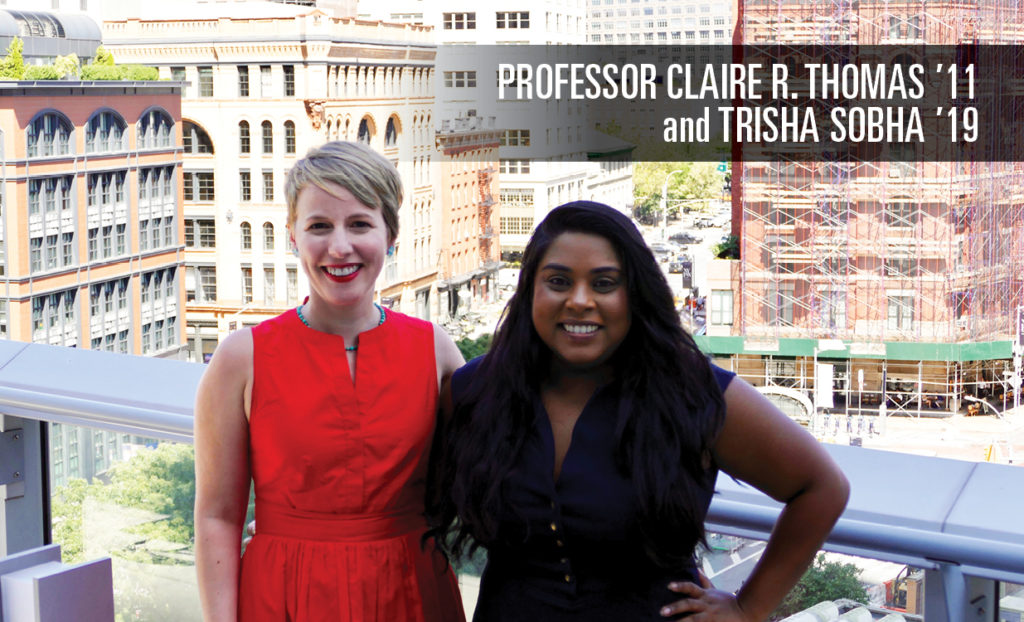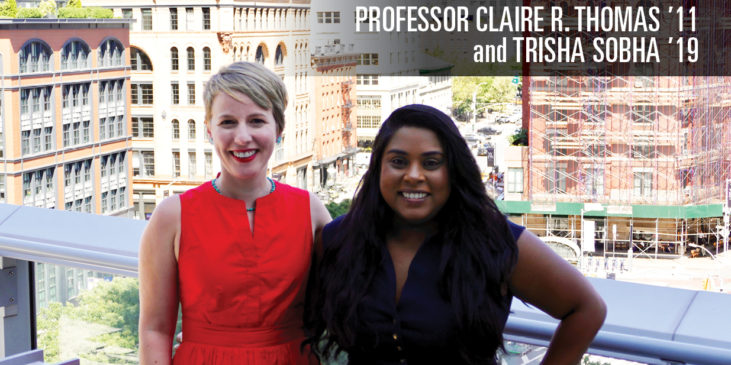
This reflection was shared by Trisha Sobha ’19, pictured above (right). Professor Claire R. Thomas (left) directs the Asylum Clinic at NYLS.
I’ll never forget the experience of representing my client, “S.”, through NYLS’s Asylum Clinic.
S. is a young Yemeni woman who was raised in Saudi Arabia. She spent most of her life forced to conform to oppressive societal norms. In 2012, S. secretly renounced Islam—a capital crime in Saudi Arabia and Yemen, punishable by death. Around the same time, she was forced into marriage to a man more than twice her age. S. suffered severe verbal and physical abuse during her marriage. She tried to endure her circumstances, but it became unbearable.
In June 2018, S. was granted an F-1 student visa and traveled to the United States with her father. Her plan was to perfect her English and attend college in the United States. At that time, as a woman in Saudi Arabia, S. was required to travel with a guardian. Additionally, she was only granted permission to leave Saudi Arabia for a limited time—about three months. S. was scheduled to return to Saudi Arabia in August 2018. Fearful for her safety, she didn’t board the plane.
Shortly afterwards, her visa expired, preventing her return to Saudi Arabia. If forced to leave the United States, her only option would be to return to Yemen, the country of which she was a citizen. That meant near-certain death. Yemen is currently a war zone controlled by the Houthis, a military and political group that has become the de facto government. The Houthis have targeted S.’s family because her father has spoken out against them. S. is also coping with serious medical issues; if she returned, she would lose access to treatment.
S.’s only chance for a safe and healthy life was to seek asylum in the United States. I met her in August 2018, and we filed her asylum application in February 2019.
S. recently reflected on what she endured: “When you’re living your life, you’re just trying to get through each day,” she said. “But just because you’re used to something doesn’t mean it’s OK. Trisha and the clinic told me, ‘That is not OK. You have the right to be safe and free.’ That was amazing to hear.”
During the months I worked with S., I spent a lot of time gaining her trust and learning what an intelligent and brave young woman she is. Together, we worked on her affidavit—a court filing that tells her story.
“It was strange at first—telling your story to people,” S. said. “When I read the final version, I started crying. It had all happened to me. I felt like I had written it myself.”
In March 2019, I accompanied S. to her asylum interview before the Newark Asylum Office. Typically, the asylum office decides cases within two weeks. However, because S. is from Yemen, a country listed on the “travel ban” (Executive Order 13769), she was subjected to greater scrutiny, which delayed her decision.
In July 2019, while I was studying for the bar exam, S. called me. She happily reported that she had received a letter granting her asylum.
“First things first, I called Trisha, even before my family,” S. said. “It was amazing, sharing the information with her, because she knew my journey.”
Now, her future looks bright. She is attending college and studying computer science. She says that she feels “hope for the first time.” I am overjoyed that she was able to start a new life and very proud to be part of her case.
Sobha works at Mobilization for Justice, where she continues to use her legal training to support immigrants.

